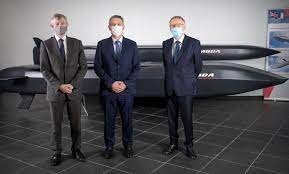Italy joins Franco-British FC/ASW programme

Rome: Italy, France, and the United Kingdom signed a letter of intent on 20 June at the Paris Air Show, accepting their new
Italian partner on the Future Cruise/Anti-Ship Weapon (FC/ASW) programme.
The French Ministry of the Armed Forces issued a press release on 26 June affirming the letter of intent.
The pan-European weapon systems supplier, MBDA, is developing the Franco-British programme, which is currently in a risk-
removal phase. By 2030, the FC/ASW will begin to replace the British and French Storm Shadow/SCALP – a long-range, air-
launched cruise missile, which began joint production in 2017 – as well as their Exocet and Harpoon anti-ship missiles.
Platforms across the UK Royal Navy, UK Royal Air Force, the French Navy and the French Air Force and now, more than
likely, the Italian Armed Forces, will be appended with the FC/ASW missile system.
The dialogue phase that will now take place between the three partners will set out the next phase of development to come. The
objective for each of the three countries is to have of an operational deep strike capability in 2030.
“This new phase of the programme will make it possible to strengthen the industrial and technological base of European defence
around the industrialist MBDA,” the French Ministry indicated.
GlobalData intelligence indicates that the Italian Navy will see a gradual spending growth toward its next-generation destroyer
programme (DDX), rising from $202m to $373m during the next decade. The new Italian destroyers will need supplementary
deep-strike capability, which the FC/ASW prgramme provides.
Moreover, Italy is already an integral partipcator in MBDA-led programmes such as the Global Combat Air Programme (GCAP)
and heavily involved in pan-European knowledge and technology sharing through MBDA Italia.
Joining ongoing partnerships such as the FC/ASW among allied countries in Europe for the joint production and development of
missiles will assist in cutting down on procurement costs through technology sharing.





